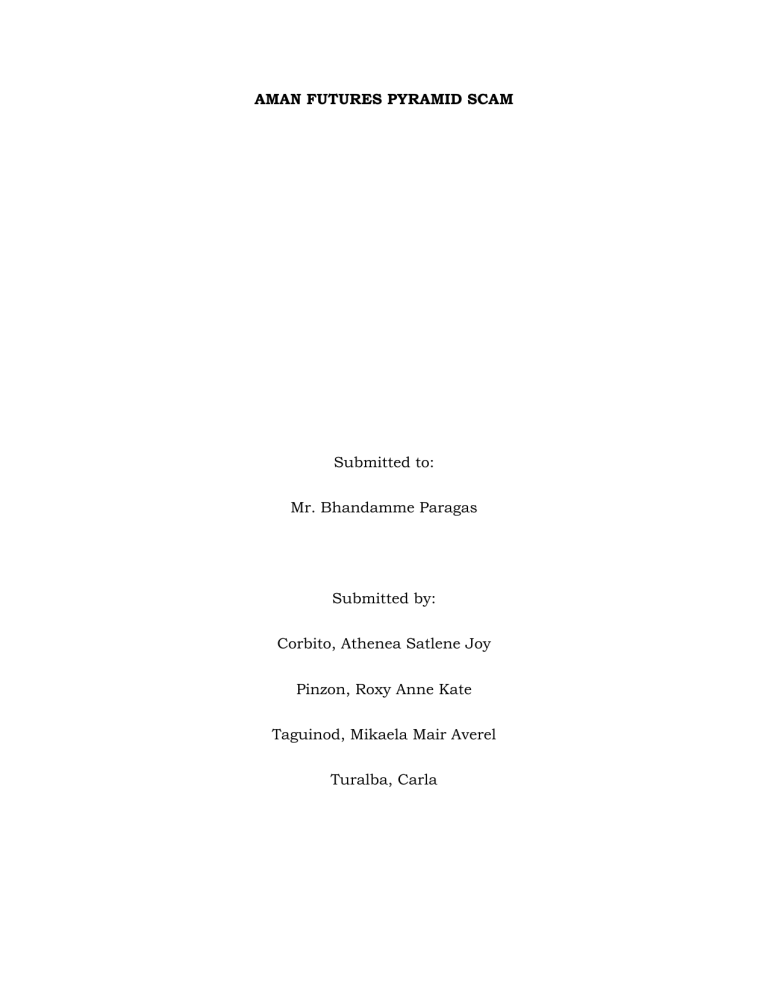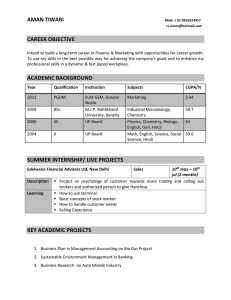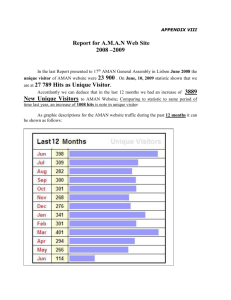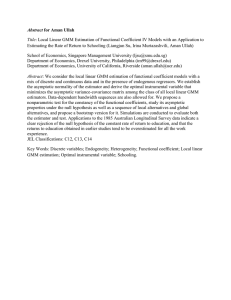
AMAN FUTURES PYRAMID SCAM Submitted to: Mr. Bhandamme Paragas Submitted by: Corbito, Athenea Satlene Joy Pinzon, Roxy Anne Kate Taguinod, Mikaela Mair Averel Turalba, Carla BSA 2-C INTRODUCTION Aman Futures is a group founded by Emmanuel K. Amalilio, a Filipino of Malaysian descent, in 2012. It was a Malaysia-based investment firm with branches in the Philippines that was privately held. It is also suspected of participating in a pyramid scheme. In the same year (2012), the National Bureau of Investigation (NBI) denounced Aman Futures as a pyramid scheme that defrauded around 15, 000 people in Visayas and Mindanao out of about 12-billion pesos of their hardearned money making it one of the biggest pyramid scam in the Philippine history. It was oriented on commodities-trading investments, and it promised investors an 80% return in 20 days. SUMMARY The pyramid scam, called one of the country's biggest in history, has plundered an estimated P12 billion hard-earned money. Aman Futures' investors number around 15,000 people, mostly from Visayas and Mindanao, and include ordinary people like fish vendors, motor cab drivers, and underprivileged neighbors. The timeline of events start on January of 2012, Aman starts encouraging the public to invest. “Double-your-money” strategy was used to dupe investors. Aman then offered investors a 30 to 40 percent return on their money in eight days and a 50 to 80 percent return in twenty days. On April of the same year, Aman is given a business permit for general merchandise. Pagadian City Mayor Samuel Co later revealed that he requested an investigation into Aman Futures on June 4, 2012. However, the NBI later stated that there were no complainants and that they were unable to collect proof since funds were deposited in Fernando Luna's account, who oversaw Aman’s operations in Pagadian City. Thus, they then advised Co to revoke the company license. However on June 6, 2012, Aman was able to submit the appropriate documents, including a Securities and Exchange Commission registration and a Department of Trade and Industry (DTI) permit apparently signed by DTI Secretary Gregory Domingo, to allow them to keep their permit. According to Aman, the money was sent to Okachi Malaysia, a trading company. Co revelead that he terminated the permit on June 18, 2012, claiming that the firm did not fit the permit that the city had granted them. The permit for Aman's business was for general merchandise, but the operation was classified as investments. Despite the permit being revoked, operations and money collection continued. According to Co, investors pleaded with him not to close it because they earned money. On June 29, 2012, Co claims he wrote to the Sangguniang Panglungsod requesting assistance in stopping Aman Futures operations. He said he doesn't know what Sangguniang Panglungsod's conclusion was. During July 3, 2012, according to Co., Aman reapplies for a permit with Pagadian City. Co said that he would not offer them another permit and dragged the application to avoid doing so. On July 11, 2012, Co responded to Aman and asked for a secondary license from SEC to approve their request. On July 27, 2012, Co authorizes Aman to operate, but insists he "technically" did not provide them a business permit. Instead, he rationalized his actions by stating that since they were already running, he would collect taxes from them. Co claims he merely duplicated the Cebu document, a tax certification, that Aman showed him. He claimed he didn't know if Aman has a Cebu business permit. It was on August 2012, Mayor Samuel Co invested in Aman to grow their campaign funds for the 2013 elections. Also that month, Co shown Aman chairman Emmanuel Amalilio the third floor of the City Commercial Center, a government-owned mall in Pagadian, as a location Amalilio could rent for Aman because the firm needed a larger facility to accommodate the lines and people that came out to invest. Co also stated that this was their first and only meeting. Co invested up to P42 million with friends, relatives, and other city hall employees in September. Towards the end of the month, Fernando Luna, the president, left ahead of Amalilio and it is when things started to change. Investors started filing complaints in the NBI against Aman for its failure to pay back their money. On September 26, 2012, Aman office shuts down and its employees were nowhere be found. On October 8, 2012, The Securities and Exchange Commission (SEC) orders a cease-and-desist order preventing Aman Futures from further soliciting public investments. It claimed the ruling was the outcome of an investigation by its Enforcement Prosecution Department in response to public and government agency concerns. On October 10, 2012, Co claims to have been in Manila. He claims he went to Justice Secretary Leila de Lima and asked her to seek a hold departure order to keep Amalilio from leaving the country. He claimed to have written a complaint affidavit against Aman that day. Co also stated he was in Manila for 4-5 days and had gone to the National Bureau of Investigation (NBI) to ask for assistance in finding Aman's home. On October 12, 2012, NBI receives a letter from Gov. Antonio Cerilles accusing Co of being involved in the scam. Co had distributed checks to investors, according to the letter. Co admitted to handing out checks but denied involvement with Aman. After Luna left, he said he distributed checks left in the Aman office. NBI confirmed that Amalilio left for Sabah, Malaysia on November 14, 2012. On November 16, 2012, Philippine Ambassador to Malaysia J. Eduardo Malaya collaborated with the Malaysian government to return Amalilio home. A 14-member special panel of prosecutors joined together to start a preliminary investigation into the investment scam. The Bureau of Immigrations also issued a lookout bulletin against 38 people suspected of being involved in the scam. According to the investigation, Aman Futures' corporate secretary, Attorney Isagani Laluna, and one of its directors, Lurix Lopez, confirmed that the company utilized two ways to entice investors. The first strategy is to use a Ponzi scheme. Ponzi Scheme is "an investment program that offers impossibly high returns and pays these returns to early investors out of the capital contributed by the later Investors" (GR Nr 10860-02, September 3, 1998). These are schemes that " promise high financial returns or dividends not available through traditional investments. Instead of investing the funds of the victims however, the con artist 'pays' dividends to initial investors using the funds of subsequent investors The scheme generally falls aport when the operator flees with all of the proceeds or when a sufficient number of new investors cannot be found to allow the continued payment of dividends" (FBI definition) The second strategy was to inform investors that their money was being put to good use. That it was legitimately used for the purpose of commodity dealing in other countries, particularly Malaysia. Aman also informed investors that it has signed a Customer Agreement with OKACHI (Malaysia), a Malaysian broker backed by a larger financial organization OKACHI (Japan). Aman Futures never got associated with OKACHI. It was also found out during the investigation that the money scammed was used by Amalilio to acquire eight planes and two helicopters, as well as two units at Upper McKinley Hills Garden Villas in Taguig City, a house in Cebu City and another in Dapitan City. On November 18, 2012, Aman's financial manager, Maria Dona Coyme, presents a declaration alleging that Co was participating in the scheme, that he solicited investors for the firm, and that he provided Aman a temporary business permit. The majority of the investment occurred when Co granted the interim authorization in mid-July, according to Coyme. However, Co claimed that Aman was only given the temporary authority to return the assets within the 60-day timeframe, not to collect money. Following that, the Court of Appeals ordered the bank accounts of 23 Aman Futures executives and associated firms to be frozen. Accounts in 25 banks and financial organizations were affected by the decree. On the other hand, on November 21, 2012, Co filed a case against Aman with the National Bureau of Investigation (NBI), claiming that he lost ₱5 million but stressing that no public funds were used. In the meantime, Department of Justice (DOJ) has issued subpoenas to 44 Aman officers and members. On November 23, 2012, two witnesses, both investors, came forward to further implicate Co and his wife in the scam. They proceeded to NBI with a paper trail that connected Co and his wife to Aman, including deposit slips to accounts in their names. According to reports, Co opened an Aman branch in Manila. Five Aman directors surrendered to NBI on November 24, 2012, fearing retaliation from enraged investors. Leilan Lim Gan, Eduard Lim, Wlanie Fuentes, Noezelle Rodriguez, and Lurix Lopez were the five directors. On November 26, 2012, the NBI filed a syndicated estafa case against Co, his wife, and ten other people. The SEC also charged the firm's directors with participating in fraudulent transactions and operating without legal registration, citing Sections 8 and 26 of Republic Act No. 8799, the Securities Regulation Code, in the timeline of events. As evidence, photos of Co with Amalilio were added to the complaint. The DOJ charged Co, his wife, and 10 other individuals with syndicated estafa on November 28, 2012. On December 2012, the appeal court ordered the freezing of 141 bank accounts in connection with the schem, including 79 of Co's and 29 of his wife's accounts. It was on December 27, 2012, Fernando Luna, the president of Aman Futures, appeared before the DOJ and revealed that he is simply Amalilio's personal driver. He claimed he was introduced to Amalilio, who needed a personal driver, but was taken aback when a box of documents was left for him to sign one day. He went on to say that he later found out that Amalilio had named him as the president of at least three Aman companies. Manuel Amalilio was caught in Malaysia in 2013 after pleading guilty to charges of falsifying travel documents. He was then set to be deported to Manila, but Malaysian officials intervened and Amalilio was sentenced to two years in prison in Malaysia. Co's bail petition was dismissed by the lower court in 2015, claiming that Co's position as Pagadian mayor was utilized to persuade the victims to invest in the scam. Furthermore, it was Co who provided the company a temporary business permit, and it was he who attempted to assist in the return of the money to the victims, which the court viewed as collusion with the scammers. However, the Court of Appeals Special 11th Division reversed the lower court’s prior ruling on the couple. According to the CA, the prosecution "failed to prove that petitioner committed any overt act in furtherance of the alleged conspiracy.” Furthermore, in the CA ruling, “The accusation that petitioner is a friend of the direct principals does not constitute strong evidence that he had conspired with them.” In addition, Co’s granting of the temporary business permit in favor of Aman just shows that it fulfilled with the obligation of submission of the relevant documentation pertinent to the application and nothing more. The court also stated that the prosecution failed to present proof that the former mayor was guilty of inviting people to invest in Aman Futures. Thus, in the end, Co and his wife each paid ₱500,000.00 as bail. Meanwhile, in 2014, the Philippine government failed to have the alleged mastermind, Manuel Amalilio extradicted back to the country to face charges related to the scam.






